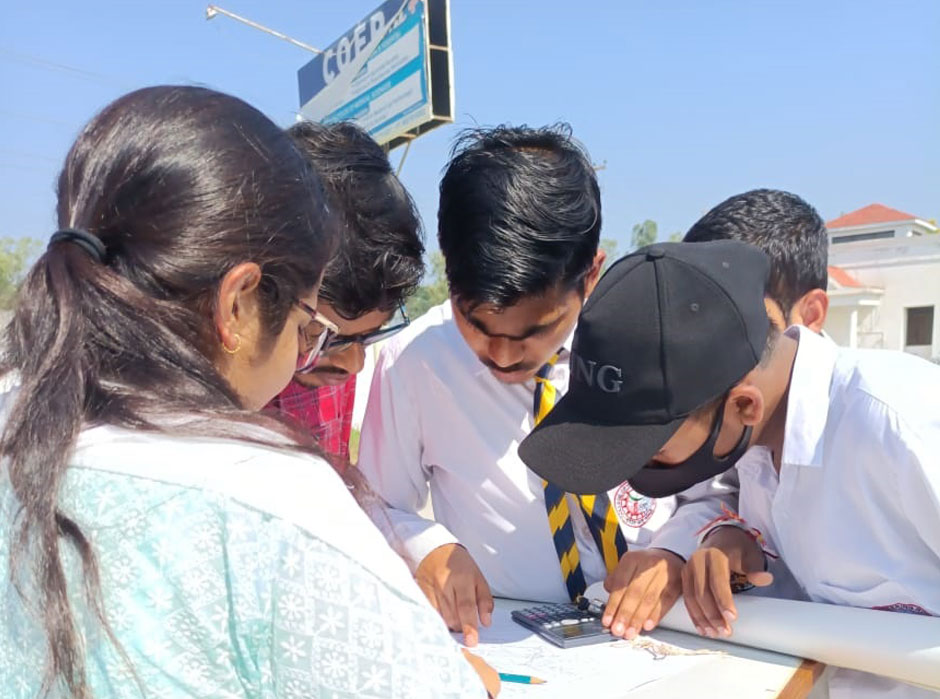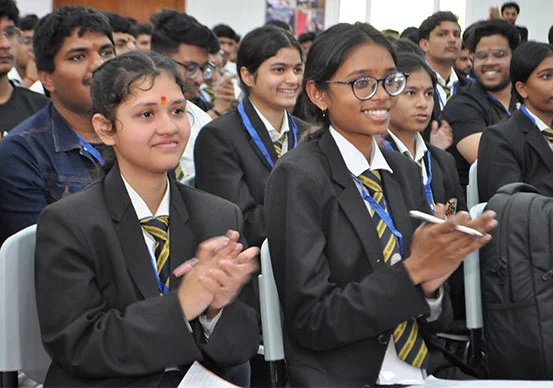
B. Tech Civil Engineering with Minor Specialization in Construction Technology / AIML / Data Science / Blockchain / IoT / Cybersecurity
Department of Civil Engineering
Eligibility Criteria |
B.Tech First YearCandidate must have passed 10+2 or equivalent from a recognized educational board with Physics, Mathematics as core subjects and third Subject from the Following Subjects (Chemistry / Computer Science / Electronics / Information Technology / Biology / Informatics Practices Biotechnology / Technical Vocational subject / Agriculture / Engineering Graphics / Business Studies / Entrepreneurship) with a minimum aggregate score of 45% (40% in case reserved category) in above subjects taken together. |
B.Tech. Lateral EntryCandidates, who have qualified UKSEE examination on merit basis, or have passed B.Sc. examination with Mathematics as one of the subjects, or securing minimum 60% marks in Diploma in Engineering or Equivalent Examination, are eligible for direct admission in second year. |
Duration |
4 Years |
3 Years |
| Apply Now |

B.Tech in Civil Engineering is a four-year undergraduate program focusing on infrastructure design, construction, and maintenance.
Core subjects include mathematics, engineering mechanics, structural and geotechnical engineering, transportation, environmental engineering, water resources, and construction management. Practical training involves laboratory work, projects, and industrial training. Graduates have diverse career opportunities in construction firms, government agencies, and consulting companies. The program also prepares students for higher studies in civil engineering or related fields.
The B.Tech in Civil Engineering program equips graduates with essential skills for designing and maintaining infrastructure, offering diverse career opportunities in construction, transportation, energy, water resources, project management, and consulting.
Admissions 2026
Find your path to Success
Curriculum
-
Engineering Mathematics
-
Basics of Electrical and Mechanical Engineering
-
Information and Communication Technology
-
Material Engineering/Essential Building Services /Civil Engineering – Societal & Global Impact
-
Innovation and Design Thinking
-
Office Application and Foundation of Professional Development
-
Engineering Drawing with Auto CAD
-
Concrete Technology
-
Building Materials and Construction
-
Engineering Mechanics
-
Standard Quality, Production Practices/ Emerging Technologies / Fire Safety in Buildings
-
Workshop Technology
-
Revit Architecture and Reasoning Concepts
-
Introduction to Internet of Things
-
Fluid Mechanics
-
Strength of Materials
-
Geomatics Engineering
-
Engineering Geology/ Process of Construction /Watershed Management
-
Open Elective
-
Data Analytics with Excell
-
Sketchup, and Analytical Skills and Professional Communication
-
Environmental Science & Energy Management
-
Evaluation of Internship I
-
Open Channel Flow
-
Structural Analysis-I
-
Soil Mechanics
-
Hydrology & Water Resource Engineering /Rural, Urban Planning and Architecture. /Intelligent Transport Systems
-
Open Elective
-
Water Modelling Software’s (HEC-RAS), and Project Building and Career Preparation
-
Reinforced Concrete Design
-
Structural Analysis-II
-
Foundation Engineering
-
GIS and Remote Sensing/Rock Mechanics /Deep Excavation and Tunnels
-
Open Elective
-
Civil Structural Design Softwares (STAAD Pro V8i/SAP2000/ETabs) and Career Advancement
-
Evaluation of Internship II
-
Highway Engineering
-
Environmental Engineering-I
-
Design of Hydraulic Structures
-
Pre-Stressed Concrete/ Bridge Engineering /River Engineering
-
Open Elective
-
Quantum Geographic Information System (QGIS), and Professional Portfolio and Capstone Project
-
Railway and Airport Engineering
-
Environmental Engineering - II
-
Design of Steel Structures
-
Advanced Pavement Design/ Robotics and Automation in Civil Engineering/ Hydropower Engineering
-
Open Elective
-
Evaluation of Internship III
-
Earthquake Resistant Design of Buildings
-
Estimation Costing and Quantity Surveying
-
Construction Planning and Management
-
Open Elective
-
Project
Career Path
Diverse Career Paths with a B.Tech in Civil Engineering include.
- Construction Manager
- Structural Engineer
- Transportation Engineer
- Water Resource Engineer
- Geotechnical Engineer
- Environmental Engineer
- Urban Planner Surveyor
- Coastal Engineer
- Project Manager

Program Outcomes
-
PO1
Engineering Knowledge: Apply knowledge of mathematics, science, engineering fundamentals, and an engineering specialization to solve complex engineering problems.
-
PO2
Problem Analysis: Identify, formulate, review research literature, and analyze complex engineering problems reaching substantiated conclusions using first principles of mathematics, natural sciences, and engineering sciences.
-
PO3
Design/Development of Solutions: Design solutions for complex engineering problems and design systems, components, or processes that meet specified needs with appropriate consideration for public health and safety, cultural, societal, and environmental considerations.
-
PO4
Investigation of Complex Problems: Conduct investigations of complex problems using research-based knowledge and research methods, including design of experiments, analysis, and interpretation of data, and synthesis of information to provide valid conclusions.
-
PO5
Modern Tool Usage: Create, select, and apply appropriate techniques, resources, and modern engineering and IT tools, including prediction and modeling, to complex engineering activities with an understanding of the limitations.
-
PO6
The Engineer and Society: Apply reasoning informed by the contextual knowledge to assess societal, health, safety, legal, and cultural issues and the consequent responsibilities relevant to the professional engineering practice.
-
PO7
Environment and Sustainability: Understand the impact of professional engineering solutions in societal and environmental contexts and demonstrate the knowledge of and need for sustainable development.
-
PO8
Ethics: Apply ethical principles and commit to professional ethics and responsibilities and norms of the engineering practice.
-
PO9
Individual and Team Work: Function effectively as an individual and as a member or leader in diverse teams and in multidisciplinary settings.
-
PO10
Communication: Communicate effectively on complex engineering activities with the engineering community and with society at large, such as being able to comprehend and write effective reports and design documentation, make effective presentations, and give and receive clear instructions.
-
PO11
Project Management and Finance: Demonstrate knowledge and understanding of the engineering and management principles and apply these to one's own work, as a member and leader in a team, to manage projects and in multidisciplinary environments.
-
PO12
Lifelong Learning: Recognize the need for, and have the preparation and ability to engage in independent and lifelong learning in the broadest context of technological change.
Program Specific Outcome
-
PSO1
The students will acquire comprehensive understanding of concepts, operation and performance of all major aspects of civil engineering such as structural, geotechnical, transportation, water resource and environmental engineering
-
PSO2
The student will have knowledge of finance and management to prepare cost estimates and execute construction works
-
PSO3
The students will have knowledge of analytical tools for developing modeling and simulation of given problems
-
PSO4
The student will have rigorous training on experimental/field work.
-
PSO5
The students will have acquired the ability to understand the scope of research work in major streams.
Program Educational Objectives (PEOS)
-
PEO1
To equip the students with lifelong skills so that they can work and contribute to the infrastructural development projects of the public and private sectors.
-
PEO2
To provide research oriented education with knowledge of state-of-art analytical and experimental tools to enable students to pursue higher studies in institutions of repute in India and abroad.
-
PEO3
To provide skill enriched education and training through internships to enable students to launch start-ups in their field of study.
-
PEO4
To inculcate a culture of professionalism, ethical conduct, team work with good communication skills to enable the students to be successful in their career.
Value Added Programs (VAPs)
| Semester | Name of VAP |
|---|---|
|
|









